Feb. 3, 2007| Noon
The Elevator Pitch
Each week on "YOUR BUSINESS," an aspiring entrepreneur with a new product or service participates in our "Elevator Pitch" segment.
They get 60 seconds to sell their concept to our panel who offer feedback and tell us whether the pitcher is ready to take their business idea before investors.
We receive many submissions from viewers to participate in the elevator pitch. However, there are specific criteria that must be met in order to be chosen:
1. You must already have a prototype of your product or have the service up and running. The elevator pitch is not for someone who has nothing more than "an idea".
2. Since this is television, our presentation must be visual and tangible. Web sites, for instance, tend to be problematic unless they have a number of visual elements.
3. You must be able to get to our New York City studios.
Keep in mind that we are a television show, not venture capitalists. By participating in our elevator segment, you will get feedback from our experts and exposure for your product, but we do not find you investors. However, we have had investors who have seen people make their pitches on "YOUR BUSINESS" and contacted them. — Scott Leon, executive producer
Jan. 26, 2007 | Noon
Debt collection
I just completed a great story about debt collection — what to do when your customers don’t pay on time. One of the funny things about finishing this piece was looking for music to accompany this story. Turns out all the songs out there which talk about debt and late payments are sympathetic to the debtor ... not the creditor! I guess musicians and song-writers tend to owe more than they lend. Hmmm…
On a more serious note, a key question that often came up for me was how does someone go about selecting a debt collection service when they need it? In the case of our story all three of the business owners we interviewed were located in one small town, they grew up together as kids, their parents know each other and they all went to the same high school and college together (it sounds impossibly idyllic, no?). So, when it comes to the delicate issues of how to handle problem customers these guys were all starting on the same page and understood what’s at stake and approached each account on an individual basis.
But the reality is that most folks in business don’t have an endless well of childhood friends to call upon who are also owners of businesses. And when you are looking for help in a touchy area like debt collection, you absolutely need a reputable agent. The best way to find one is, of course, word-of-mouth. Ask other business people whom you know and trust and who have similar attitudes about these things for suggestions. If that doesn’t work for you, go to one of the several national or state organizations of collection specialists such as http://www.acainternational.org/. These groups are very concerned about ethical standards and they will often be glad to make referrals in your local area.
— Frank Silverstein, producer
Jan. 17, 2007 | 6:00 p.m.
A trend towards ‘Custom’
I was lucky enough to “pitch” my business in the elevator on MSNBC’s “Your Business” on Sunday and what a “ride” it was. My e-commerce company www.fabricworkroom.com sells custom made window treatments, bedding, shower curtains etc. to consumers. On the elevator I was asked a question that brought me back to why we developed our business model 2 years ago. Rod Kurtz, Senior Editor at Inc. Magazine and Inc.com, asked the question “Why Custom”? A great question I admit but it actually caught me by surprise. I gave the typical answer “on air” that people “want something unique that is not offered in the big chain stores” (smart answer I thought, after a segment on big chains vs. a small local bookstore just minutes before). However, while I still firmly believe what I said, the real answer is “Why NOT custom?”
There is little doubt about the trend towards custom products from cars to jeans to sneakers and extends to how we order our Starbuck’s coffee. Innovative companies have made “customizing” so easy that literally anyone can do it! Our business model is based on a very simple concept - make it easy, make it affordable. The Internet gave us the vehicle to make it easy and affordable while capitalizing on another trend towards “do-it-yourself.” Today’s consumers are more demanding and at the same time more adventurous. Custom shopping is no longer intimidating and only for the wealthy. All these companies, including FabricWorkroom.com, have proven that when consumers can get exactly what they want, they get hooked.
We hear all the time from customers who never considered custom window treatments before, due to the cost and the “unknown” process of working with a decorator. Companies like ours continue to break down the barriers and open up the market to those very consumers. In our $10 billion custom home decorating industry I can truly say that we have succeeded in changing the consumer landscape while expanding the market to new users. So ask yourself the next time you are thinking of an idea for a new business, “Can this be Custom?”
Jackie Keehan
Co-Founder, www.Fabricworkroom.com, Elevator Pitch guest 01/14/07
Dec. 13, 2006 | 1:30 p.m.
Jumping in head first
A good friend of mine called me recently asking for some advice. She's a teacher with no traditional business experience. Out of the blue, though, she was just given the opportunity to consult for a major corporation and called in a panic asking how to set up a consulting business. She was paralyzed by what she believed was going to be an insurmountable mountain of confusing contracts to draw up, policies to create and licenses to apply for.
I immediately sent her to the Your Business site and had her watch a few of the stories we covered about people who didn't (over)think, they just acted. Her opportunity is the kind that comes once in a lifetime and while I would never tell her it's going to be easy, I did tell her that she'd be crazy to pass it up. The resources available, ranging from Internet sites to free consulting to her friends, are wide and will get her through the difficult parts. And, as long as she's gone down the road of envisioning the worst case scenario (the business failing) and she's okay with it, then there's no reason not to jump in head first.
Small business owners, by nature, are generally risk takers. There's no guarantee of success, but the personal rewards, if things do work out, are so great that they generally make up for any bumps in the road. — JJ Ramberg
Dec. 4, 2006 | 1:30 p.m.
Producer Lisa Everson blogs about an inspirational entrepreneur who turned his love for mountain biking into a profitable business…
Ray Petro has a passion for mountain biking. So much so that he created a business to satisfy his craving for riding in the cold winter months in, of all places, Cleveland, Ohio. Living a life of extremes has been Ray’s salvation and curse. His love for mountain biking helped him kick a drug and alcohol habit. Sober for over 10 years now, his only true addiction is riding his bike. His dream of opening an indoor mountain bike park was realized when he found an awe-inspiring space tucked away in a large industrial complex at the edge of a residential area in Cleveland. The space was once a high security area because it was the home of Industrial Rayon Corporation, a WWII era parachute factory. Now, a whopping 82,000 square feet of the space is Ray’s MTB or Ray’s Mountain Bike, his personal “Field of Dreams.”
If you build it, they will come…
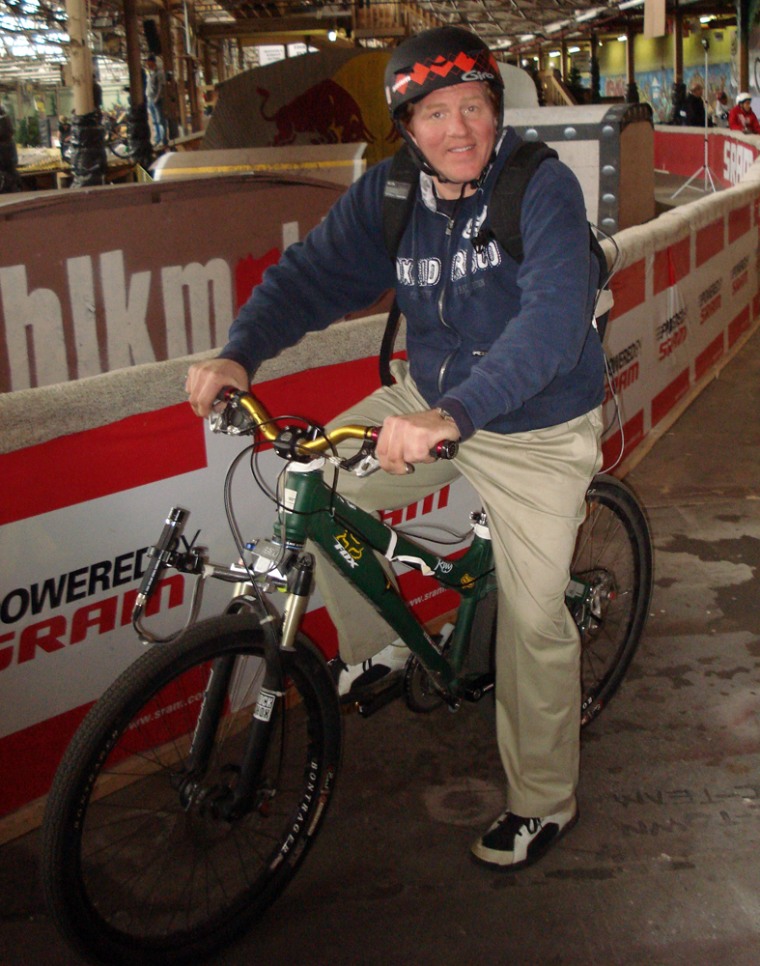
Ray’s MTB and its namesake, Ray Petro, managed to open the world’s first indoor mountain bike park in November, 2004, despite some pretty serious obstacles -- the biggest being the city of Cleveland itself. In an era when a rustbelt city is trying hard to reinvent itself, an idea like Ray’s MTB is a shock to the system. While the city didn’t see it Ray’s way in the beginning, there were a staunch few who did. With help from local councilman, Jay Westbrook, Ray was able to navigate through the labyrinth of red tape so he could meet city codes, and keep the park open. Ray spends his summers when the park is closed (Ray’s MTB is open for the Fall/Winter season) remodeling the maze of bridges, trails and berms so his diehard fans don’t get bored. A dream for his name brand sponsors, Ray spends every dime growing and pushing the limits of what an indoor mountain bike park can be. Not only does he have a local following, but enthusiasts and pros worldwide are flocking to Ray’s. Gary Fisher, a pioneer of the sport of mountain biking, was on hand for Ray’s grand opening this past November. Also on hand were Hans “No Way” Rey and Greg Watts.
During the weekend that we taped the story, JJ and I had the chance to hang out with Ray and get to know him. How do you describe him? Red haired, blue eyed and as genuine as they come – he’s humble, hard working and sincere. He manages to greet just about everyone who walks through the doors – asking where they’re from, shaking hands and thanking them for their visit. The visitors in turn thank him for building the park. It’s a surprisingly touching scene to watch in a largely testosterone-filled environment.
Along for the Ride… JJ had a blast riding around Ray’s taping our show open and close. She kept telling us (our cameraman Jared Manders and I) to gear up and ride, but the uber-responsible producer in me kept putting it off. Story coverage first, fun second. We said our goodbyes, but Jared and I vowed to return, kicking ourselves for missing our chance to take a spin in Ray’s “Field of Dreams.”
Comments? Email
Watch 'Your Business' Sundays at 7:30 a.m. ET on MSNBC.
Nov. 22, 2006 | 5:30 p.m.
Executive producer Scott Leon blogs about the show's focus and the unique experience he wants to provide viewers.
(Scott Leon, "Your Business" executive producer)
When we created "Your Business" our intention was simple: to provide stories, information and advice to help entrepreneurs grow their business. One of the ways we do that each week is to take an in-depth look at a business owner who faced unique challenges and issues that others can learn from. We're often pitched profile stories from people who are interested in gaining press for their endeavors, but that's a disservice to our viewers.
An examination of some of our recent stories gives a good idea of what we look for: Former Enron employees who lost everything and went on to start their own companies; a spa owner who learns to work with city government to rectify parking problems and a small bookstore owner fighting to survive in the age of big chains and Amazon.
If you have a story of overcoming business and personal obstacles, we'd love to hear from you. There are lessons for our viewers to learn from these stories, even if the end result was failure. Our address is yourbusiness@msnbc.com
Comments? Email
Watch 'Your Business' Sundays at 7:30 a.m. ET on MSNBC.
Nov. 9, 2006 | 5:30 p.m.
Producer Frank Silverstein blogs about customized cars and how they symbolize almost everything to their builders, owners and drivers — freedom, ambition, sex, power, smarts, color and style.
(Frank Silverstein, producer "Your Business" )
The expression: “Souped-up” hardly does justice to the process of customizing an automobile engine. These babies have been so expertly recalibrated, remilled, repainted and refined that a race driver can push these engines way beyond their original specifications to speeds well above the speed limit anywhere. The guys who build these exult in the fact that the mass-market-machinists who originally built them would never recognize these pumped-up-puppies that now tear down the track at 170 mph
These vehicles —customized cars or ‘dragsters’ — are almost everything to their builders, owners, and drivers! They are freedom, ambition, sex, power, smarts, color and style. As a group, these folks occupy a social world fueled by adrenaline and driven by competitive pride … entirely focused on the speed of the cars.
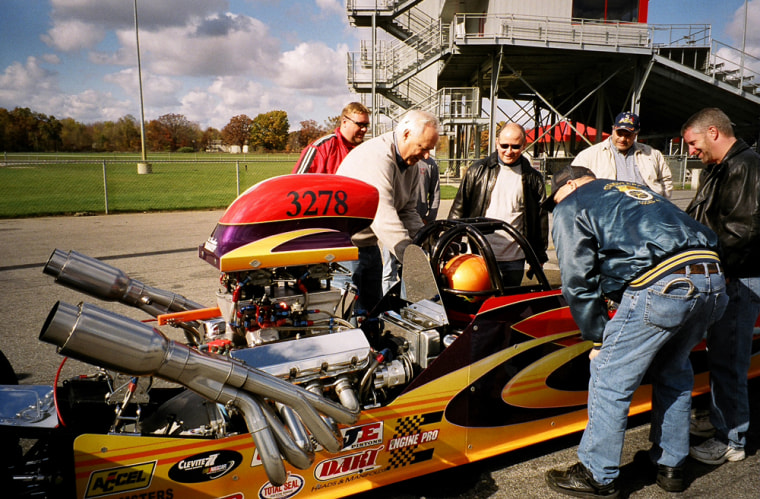
What these vehicles are not … are ‘grocery getters’ — a derisive term used by these same engine-addicts to describe the off-the-assembly-line, speed-limit-respecting, grease-gushing, automatic shifters that the rest of us mortals use for the mundane tasks of everyday life. We humble ‘grocery seekers’ do not have engines with pistons which are annually removed, scoured, weighed, shaved, smoothed, fondled and returned to their housings.
JJ and I flew out to Grand Rapids a couple of weeks ago to meet Kathy (Weed) Huizinga, her son, Nick, and Bill and Mike and Don and the rest of her crew at Performance Engineering. And we got an earful of growling, howling, whining, humming, throbbing high-performance engine noise. I was surprised to see Kathy’s jaw suddenly grow slack, her eyes widen and her head cock a bit to the side as she listened raptly to the chug-a-la, chug-a-la, sound of a CAT diesel engine with dual turbos recently completed V.L. Watkins Trucking, by the guys in her shop.
“Its all about the sound,” she told me….“and in fact,” she continued, “Its pretty common for customers to walk in off the street and put down well over $2,000 just to make their engines sound more intimidating.” I have to say, I’ve never thought of a car engine as a form of musical instrument.
Of course, if you’re a race-car driver, it’s not the sizzle but the steak… and for Kathy, engine ‘muscle’ has its own perfect pitch. Like the mother of a newborn, who is on constant alert for each gurgle, burp and cry of her baby, Kathy’s ears are constantly tuned to the piercing drone of a perfectly hopped-up engine.

When we headed out to Michigan, I came with all the baggage of any reporter on deadline. I had my list of sound bites which I intended to collect for a story about a woman in a so-called “man’s business” — the ‘brave front she had to put on to hide the tears inside,’ ‘her scornful triumph over chauvinistic customers and employees,’ ‘the painful moments of self-doubt which are now gone after years of learning to master the rules of working in a man’s world,’ …the list can go on.
Well, guess what? Boy, did I have it wrong — and she let me know it! She’s a hard worker in a highly competitive field, plain and simple, get it?
And she’s had some very dark moments, like when her 40-something husband died of cancer, leaving her with two small kids to feed and a garage full of employees depending on her for their wages.
But as she so thoughtfully put it, “It was sink or swim, and I’m a swimmer, not a sinker!” She remembered that her husband Mike had always stressed that the shop’s work was a group effort and it was her job to keep that group spirit going and she did what was needed to keep the business afloat and her workers employed and bread on the table for herself and her kids.
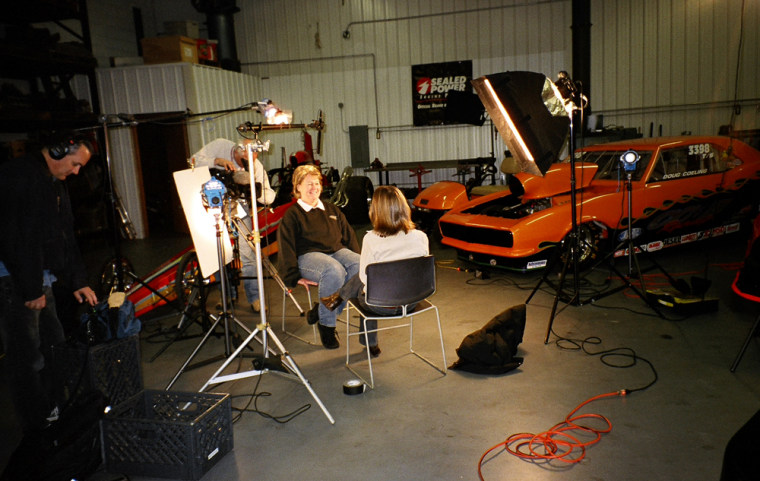
She had to rely on a team of highly skilled workers to produce a product that cannot afford to have even the tiniest flaw. She immediately recognized that her own survival depended upon the team she’d assembled and that meant putting their interests at the top of her priority list.
“Take care of those who are loyal (employees and customers) and trust that they will take care of you!” Fie! on the female-in-a-man’s-world clichés! And, for her, it worked.
The only fault one of her long-time customers could find is that she’s hasn’t grown the business any bigger than it was when she took over 14 years ago. Mike Blackmer, co-owner of neighboring Boyne Machines claims Huizinga could have easily doubled her business, but he says she’s operating in a ‘comfort zone’ that works for her.
What’s that ‘comfort zone’ like? Well, its not the timid, quiet, cloistered world that phrase usually suggests. At the end of her day, Kathy Huizinga climbs into her delicate-looking classic rebuilt 1934 Ford 3-window coupe with its anything-but-timid 502 horsepower engine. And when the light changes she hits the gas … zips out… and ‘frosts’ everything else on wheels surrounding her…and she can’t quite help herself from chuckling at gaping stares of everyone left behind.
And at this point, JJ was definitely ready to sign on to the great-American-custom-car-romance.
Girlz!
Comments? Email
Watch 'Your Business' Sundays at 7:30 a.m. ET on MSNBC.
Nov. 2, 2006 | 5:30 p.m.
Blog by Adam Berk, co-founder of neighBORROW.com, and recent elevator pitch participant on "Your Business" TV show.
(Adam Berk, co-founder of neighBORROW.com)
A few weeks ago, I learned of an opportunity to pitch our young business, neighBORROW.com, to potential investors on a mock 60 second elevator ride. Needing capital and exposure as all new businesses do, we submitted our ideas to "Your Business" hoping to accomplish both (ultimately, we actually accomplished much more than we hoped). After a little phone tag (a game at which I'm trying to get worse or quit playing altogether, especially in situations like these) we realized that we might get the chance. It's a good thing, too, because I wasn't quite prepared to tell my partner how I blew the opportunity by failing to check my voicemail for two straight days. We explained our idea and our business to a few producers and to the host of the show. Before long, we were penciled in or "soft booked" (I even learned a few industry terms) and not long after that we were confirmed for taping on Oct. 26.
Mark Twain once said, "I didn't have time to write a short letter, so I wrote a long one instead." This seemingly contradictory idea couldn't have been more relevant. I have been thinking, speaking, writing, and living neighBORROW ideas for more than a year. I could have easily filled 60 minutes with descriptions, plans, ideas and answers. 60 seconds, however, was a challenge. I was already prepared to speak about neighBORROW at length —to speak about it briefly —was going to take some preparation.
We honed the pitch, scrambled to get parts of the site look and function better and even picked out a TV shirt. The earliest bedtime in years and a goodnight sleep and already it was filming day!
Working long hours from home and bootstrapping (sort of), it wasn't a regular occurrence to have a black Suburban and a driver waiting for me outside the door of my building. After a traffic-free reverse commute into Jersey, we arrived at MSNBC's studio promptly at 10 a.m. I finally got to meet Danielle, the associate producer who arranged everything so well. I spent some time in the green room where I had the opportunity to chat with the host, J.J. Ramberg and with senior producer, Bob Males. I also had a few minutes to check stock quotes, email, goodsearch.com (Editor's note: for the sake of full disclosure, goodsearch.com is JJ's company) and to grab a handful of strawberries for good luck.
Downstairs for makeup (don't tell anyone) and a microphone and we were nearly ready. I met the other panelists briefly and on the way in I offered them each a boatload of equity for a positive review. We entered the studio and it's pretty much as I expected: Lights cameras and action; people and fancy equipment too. We got right to it and I was ready to step in on the ground floor. The words came out alright, but apparently my excited body language and movements were enough to make even the most seasoned sailor a little queasy. Had we been on the radio we would have had a rap. Instead it was take two, three and maybe even a couple more. Everyone was super patient and helpful. I took a moment to deal with the irrational bug in my brain that was causing the glitch. I told it to get lost and finally, it complied.
A few days between filming and airing your nationally televised debut can give anyone a little anxiety. We continued to work hard on the site in preparation for the big debut. 7:42am Sunday morning and the cell phone rings. Then the apartment line. The the distinct click of a new email resonates from the computer, and again, and again. I log in to the database and even find a few new neigh-BORROW-ers already. Success! We're famous! Back to bed for a few hours and then the emails and phone calls and registrations resume and continue to trickle in throughout the day. The first two are undoubtedly a result of the DVR age in which we live. Only those who really like you are going to watch you live, when they know they can just watch you later. I must admit that even I entertained the idea!
What an opportunity! No one was writing checks right on the spot but we met some great people, motivated ourselves to perfect our pitch and finish certain things ahead of schedule, examined and answered key questions about our business.
We got the exposure we wanted and had a blast!
Comments? Email
Watch 'Your Business' Sundays at 7:30 a.m. ET on MSNBC.
Oct. 19, 2006 | 5:30 p.m.
Producer Frank Silverstein blogs about entrepreneurs who have made their love of scaring other people into a profitable business.
(Frank Silverstein, producer "Your Business" )
As a business reporter, I often hear B-school advisors vigorously warn new grads against entering a business they know nothing about… “If you’re picking a business,” they say, “pick something you know and love.” The reason? Since you’re going to be spending most of your waking hours fussing, worrying about, and promoting it… you darn well better love it!
In the story I’m currently working on, the problem is not that too many enter a world they know nothing about… but the opposite… it’s a world they love far too much — haunted houses.
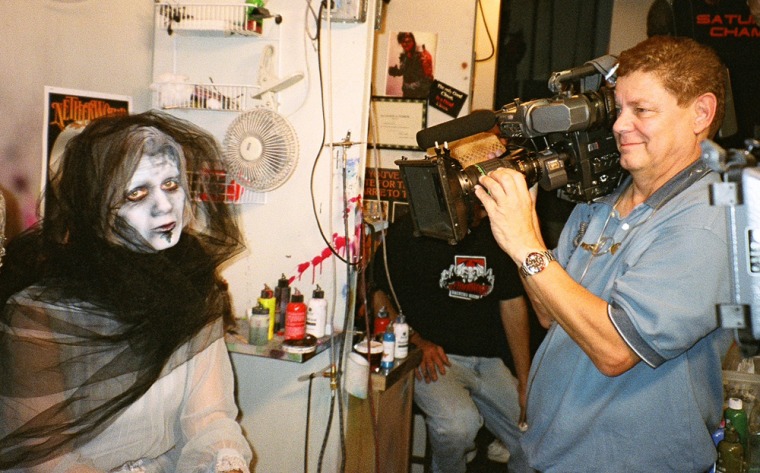
The customers and employees alike call themselves “haunters” and that includes theatrical make-up artists, mural painters, building contractors, robotics engineers, costume designers, pyrotechnic experts, actors and musicians and more. The owners call themselves “Hauntrepreneurs”! What they all have in common is they love to scare the stuffing out of other people.
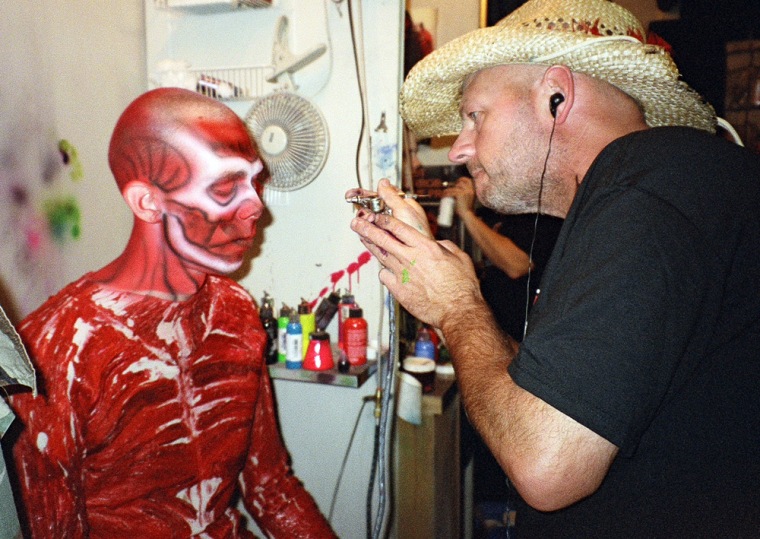
The ‘startle’ vs. ‘true’ fear
Ask Leonard Pickel how he got into this, and he’ll answer: “cause scaring people is sooo much fun!” Ask Ben Armstrong, owner of Atlanta’s “Netherworld” attraction, and he’ll give you a more scientific answer… “there’s a difference between a ‘startle’ and a ‘scare’. “A startle is an unexpected surprise that causes your adrenaline to spike until you realize everything’s okay then the adrenaline recedes and you’re ready for the next surprise… then it all falls off and you feel this enormous relief and you laugh out loud.” He says, that’s what haunters really aim for. “Real fear is something else completely, much more serious …and we try to avoid that.” But when you push him to say why he does this, a dark sinister voice from deep-within croaks out the words: “Because I love it!”
And when it comes to reaching their target audience of young men and women in the age group of 15 to 35… these guys are masters. It’s a consumer group that many marketers covet and spend a fortune to reach, but for “haunters” like Pikel and Armstrong it’s a demographic that they manage to grab on a fairly modest budget.
What’s the secret? According to Ben Armstrong there’s no secret at all, “… the audience finds us…” he says, we just put the information out of where to go, make sure they hear about it and the lines just get longer and longer.
Comments? Email
Watch 'Your Business' Sundays at 7:30 a.m. ET on MSNBC.
Oct. 5, 2006 | 5:30 p.m.
Marketing 'outside the box': Untraditional marketing techniques can pay off big-time
(Bob Males, senior producer)
Over the past few weeks, I’ve heard about a couple of companies taking chances with untraditional marketing techniques that paid off big-time for them.
After using Craig’s List for its initial marketing, Zen Home Cleaning in NYC was reviewed by Daily Candy. Zen is a 5-star residential cleaning service using non-toxic cleaners. After they were written-up on the very popular Daily Candy Web site, the number of phone inquiries they got exploded from several a week to five hundred on the very next day! Months later, the calls keep coming. Zen’s cleaning staff mushroomed from 3 to 15 (and they need more like 20). Now, the owner is fielding requests for franchises from other cities. Daily Candy may not work like that for every business. For instance, the guys at Dirtbag Clothing had to find their own way.
Dirtbag Clothing, which we’re preparing a story on, went backstage at music events and hung out with the bands’ road crews. They gave away free clothes to the crew, which exposed musicians to their fashion. When the bands asked for clothes, Dirtbag “comped” them. The company also emailed 4,000 music groups and offered to supply stage clothes. Dirtbag’s revenues grew when audiences saw their designs at hundreds (maybe thousands) of music performances. It’s another guerrilla campaign you’ll never find in a traditional marketing textbook.
Paraphrasing marketing guru Andy Cohen (author of "Follow the Other Hand"): innovate and challenge the assumptions about your business.
Comments? Email YourBusiness@msnbc.com
Watch 'Your Business' Sundays at 7:30 a.m. ET on MSNBC.